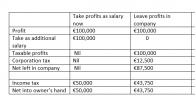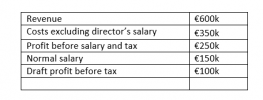Brendan Burgess
Founder
- Messages
- 55,428
The big mistake a lot of company owners make is the very simple statement "Corporation Tax is 12.5% while total taxes on income are 50%, so I will leave the profits in the company and pay less tax."
The problem with this is that they will have to pay tax on the profits when they extract them from the company.
In simple terms

So the owner of the company will have the illusion of paying less tax and having more money, but that more money will be sitting in the company and whenever they access it they will have to pay tax on it.
If you choose to leave profits in your company, you should have a written plan from your tax advisors explaining why you are doing so and how and when you are going to extract that cash tax-efficiently.
While every case is different, there some common principles which owners of companies need to understand so that they better understand their accountant's tax advice.
The problem with this is that they will have to pay tax on the profits when they extract them from the company.
In simple terms

So the owner of the company will have the illusion of paying less tax and having more money, but that more money will be sitting in the company and whenever they access it they will have to pay tax on it.
If you choose to leave profits in your company, you should have a written plan from your tax advisors explaining why you are doing so and how and when you are going to extract that cash tax-efficiently.
While every case is different, there some common principles which owners of companies need to understand so that they better understand their accountant's tax advice.
Last edited:



